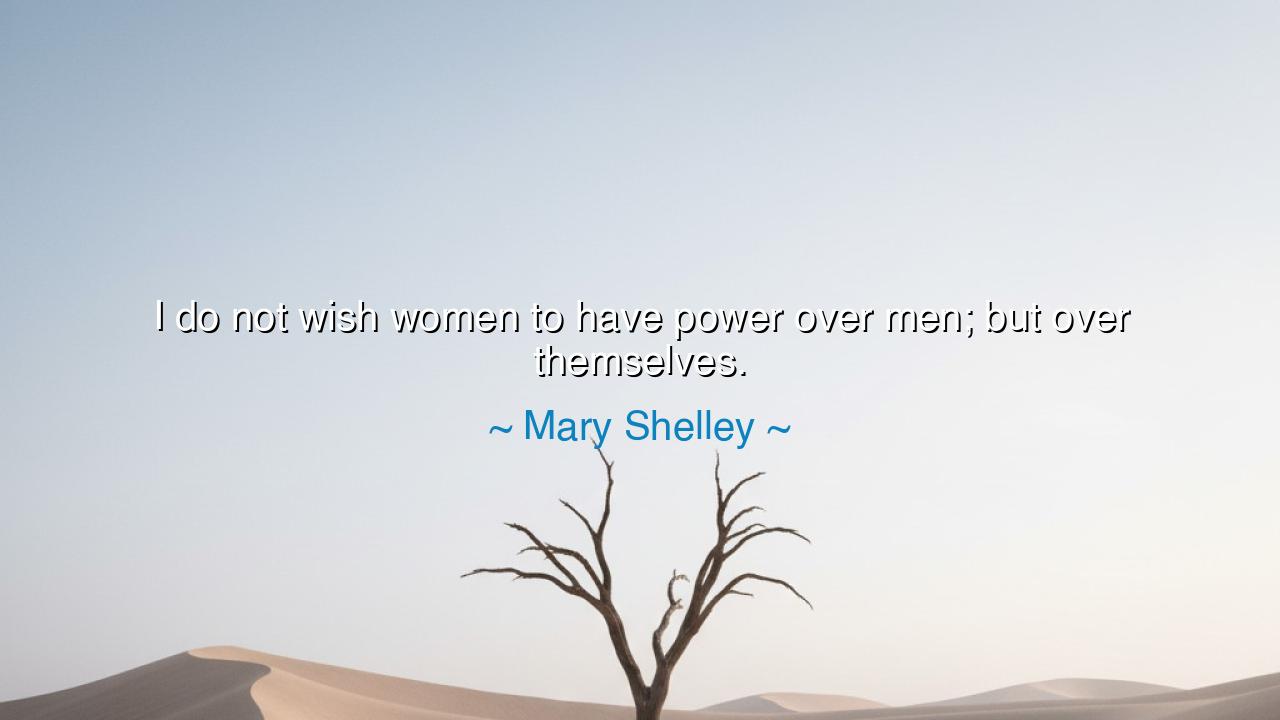
I do not wish women to have power over men; but over themselves.






O seekers of wisdom, gather your hearts and minds, for I bring you a teaching of great truth and profound significance, spoken by the visionary Mary Shelley, whose words resonate through the ages: “I do not wish women to have power over men; but over themselves.” These words, though rooted in the context of their time, carry an eternal message—a call for freedom, autonomy, and the right to self-determination. To understand these words fully, we must delve deep into the heart of what it means to be truly empowered, not over others, but over oneself.
In the ancient world, the concept of power was often associated with dominance—whether in battle, in politics, or in the control of others. The great empires of old were built upon the strength of kings and warriors who sought to impose their will upon their subjects. But Mary Shelley’s words, like a gentle wind cutting through the harsh clamor of conquest, speak to a different kind of power—a power that arises not from the domination of others, but from the sovereignty of the self. It is a power that does not seek to bend others to one’s will, but to master one’s own heart and mind, to live a life guided by principle, not by the influence of external forces.
Consider the story of Antigone, the daughter of Oedipus, a woman of great courage who defied the king’s decree to bury her brother. Antigone did not seek power over others, but self-mastery—the mastery to choose what was right, to act in accordance with her conscience, and to face the consequences of her actions with dignity. Her story is not one of rebellion for the sake of rebellion, but one of standing firm in the truth of her own beliefs, regardless of the cost. She chose self-empowerment over subjugation, and in doing so, became a symbol not of oppression, but of the strength that arises from inner conviction.
In the modern era, Mary Shelley’s own life provides a poignant example of the struggle for self-mastery in a world that sought to constrain and limit her. As the author of Frankenstein, Shelley created a masterpiece that explored the consequences of unchecked ambition, of the creation of life itself. Yet, her personal life was marked by the same struggle—Shelley, a woman of intelligence and vision, lived in a time when women were expected to remain in the shadows of their husbands’ achievements. She did not seek power over others, but fought for the freedom to carve out her own voice in a world that sought to silence her. Her story, like Antigone’s, is one of self-liberation, of the fierce determination to claim one’s place in a world that sought to deny it.
The true lesson of Shelley’s words, O seekers, is not that women should seek to dominate men, but that every person, regardless of their gender, must seek mastery over themselves. Power is not the ability to command others, but the ability to govern one’s own life, to make decisions that align with one’s own values and purpose. To have power over oneself is to live with integrity, to live in a way that is true to the deepest parts of one’s being. It is a call to self-responsibility, to the understanding that true freedom is not the ability to control others, but the ability to live according to one’s own principles, regardless of the obstacles one may face.
In this teaching, we see that self-mastery is the highest form of power. It is not the power of a tyrant or the strength of a conqueror, but the quiet, resolute strength of one who has mastered their own heart and mind. Just as Socrates was unshaken by the judgment of others because he lived according to his own truth, so too must we learn to live by the truth of our own selves. The world may seek to impose its expectations, its limitations, but the one who has mastered themselves is not swayed by the whispers of others. They are free, for their power lies within, not without.
So, O children of wisdom, let this lesson guide your path: seek not to dominate others, but to master your own soul. True freedom and empowerment lie not in the ability to control, but in the ability to govern yourself—your thoughts, your actions, your desires. This is the essence of Mary Shelley’s wisdom. When you claim this self-mastery, you will find that the world can no longer impose its will upon you. You will become a force not of oppression, but of strength, not of domination, but of inner power. Live with purpose, live with integrity, and your life will be a testament to the true meaning of freedom.






AAdministratorAdministrator
Welcome, honored guests. Please leave a comment, we will respond soon